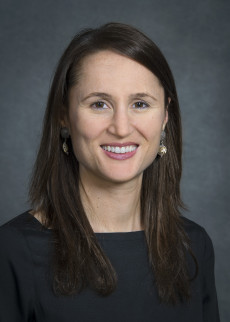Katie Antypas Named New Head of NERSC Services Department
September 3, 2013
Katie Antypas, who has led NERSC’s User Services Group since October 2010, has been named as the new User Services Department Head, effective September 23. Antypas succeeds Francesca Verdier, who will serve as Allocations Manager until her planned retirement in June 2014.
Antypas is also the project lead for the NERSC-8 system procurement, a project to deploy NERSC's next generation system in the 2015 timeframe.
“Katie’s leadership in ensuring that NERSC users are able to maximize their use of both our current and future systems has positioned her well to help lead NERSC users and staff into the next era of extreme scale computing,” said NERSC Division Director Sudip Dosanjh.
The NERSC-8 system is the critical next procurement step for NERSC and will provide a significant upgrade in computational capabilities, with a target increase between 10-30 times the sustained performance over the Hopper system (also known as NERSC-6). In addition to increasing the computational capability available to NERSC’s 4,600 users, the system also needs to be a platform that will begin to transition DOE scientific applications to more energy-efficient, many-core architectures.
Antypas joined NERSC’s User Services Group in 2006, serving as a consultant to users. She was the co-implementation team lead on the Hopper project, NERSC’s first petaflop/s system, a Cray XE6 with over 150,000 compute cores which delivers more than 3 million computing hours to scientists each day.
Before coming to NERSC, Antypas worked at the ASC Flash Center at the University of Chicago supporting the FLASH code, a parallel adaptive mesh refinement astrophysics application. She has an M.S. in computer science from the University of Chicago and a B.A. in physics from Wellesley College.
About Computing Sciences at Berkeley Lab
High performance computing plays a critical role in scientific discovery. Researchers increasingly rely on advances in computer science, mathematics, computational science, data science, and large-scale computing and networking to increase our understanding of ourselves, our planet, and our universe. Berkeley Lab’s Computing Sciences Area researches, develops, and deploys new foundations, tools, and technologies to meet these needs and to advance research across a broad range of scientific disciplines.







 Instagram
Instagram YouTube
YouTube